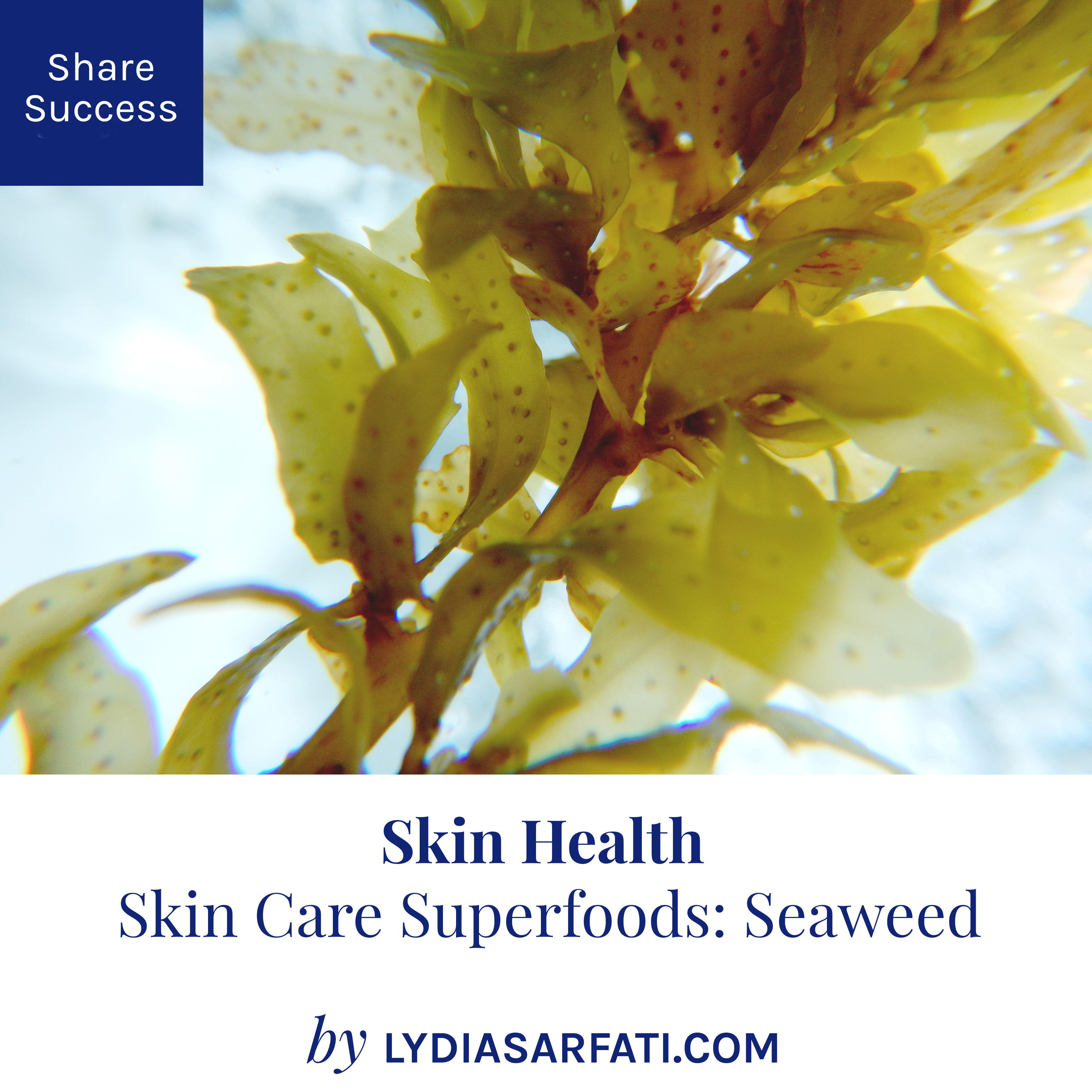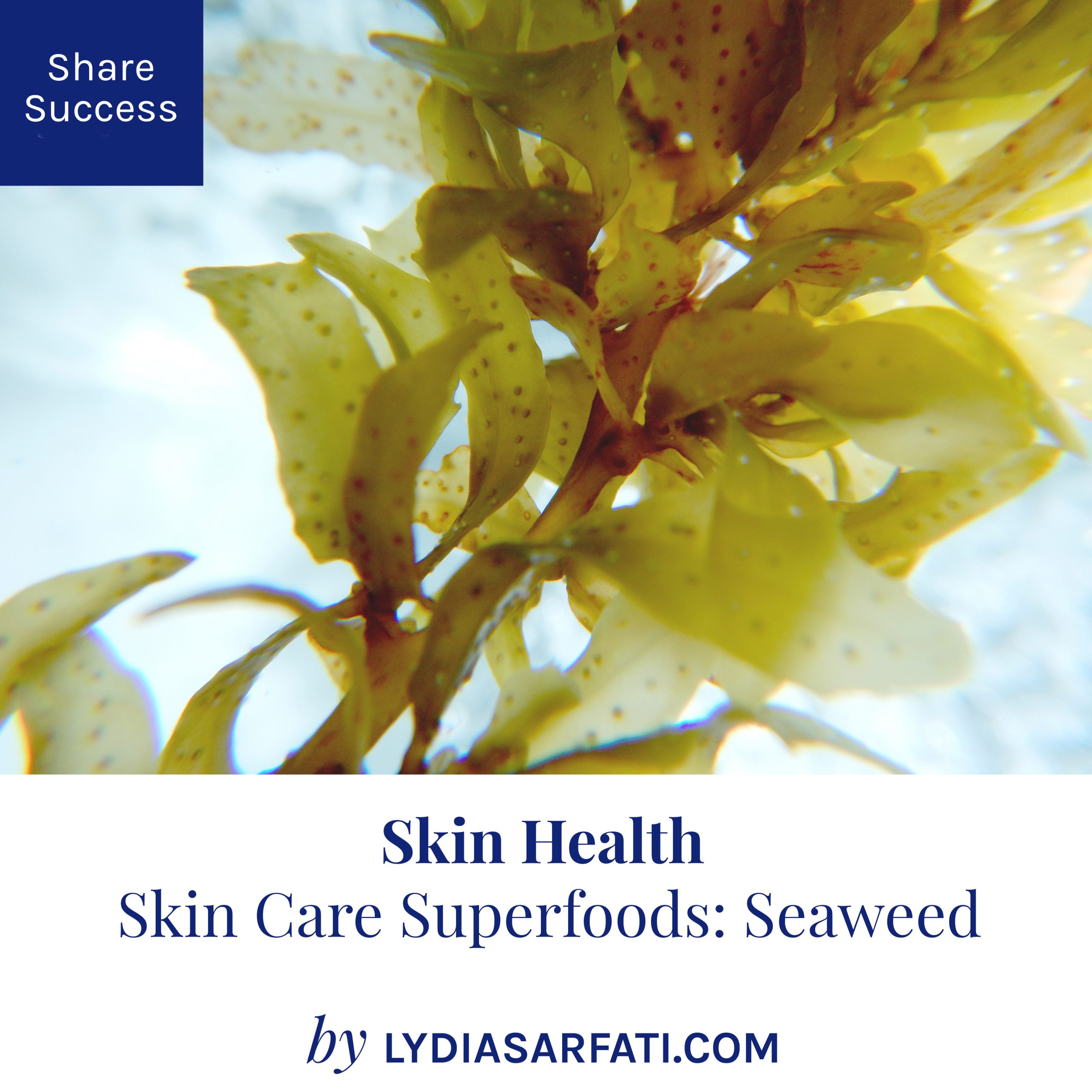
At Repêchage, we have known about seaweed as a super-ingredient for skin care for decades.
Today, seaweed is one of the emerging new superfoods. Considered to be the new kale, seaweed has actually been a key element in the diet of many cultures for thousands and thousands of years, including Japan and in the North Atlantic.¹
This week I want to share with you the skincare, antioxidant, health and nutritional benefits that make seaweed an amazing superfood for your skin and diet.
Seaweed – A Bio Stimulant
My first discovery of seaweed happened during a trip to Israel in the 1970’s. In the arid desert farmers were growing and harvesting delicious fruit and vegetables. I was curious as to how this was possible in such a dry climate.
We discovered that they used seaweed as a bio-stimulant for the plants because seaweed retained water longer and the elements of seaweed were very nutritious for the plants.
This led me to do more research on what seaweed could do for the skin. Nearly 40 years later, we see seaweed in skin care and today science backs the many cosmetic and nutritional benefits of this skin superfood.
The Skin Care Benefits and Antioxidant Benefits of Seaweed
Seaweed is such an amazing skin care ingredient!
In skin care, specific seaweeds can be used to create a number of beneficial cosmetic effects including decreasing the appearance of oil, diminishing the appearance of fine lines and wrinkles, exfoliating the skin for a more luminous looking complexion and moisturizing the skin to make it feel and look soft and smooth.
Research has found that Seaweeds are one of the richest sources of natural antioxidants, containing phlorotannins, sulfated polysaccarides, fucosterol and fucoxanthins. ²
Besides being a rich source of vitamins, minerals, amino acids and phyto-hormones, the many different species available throughout the world are rich in unique bioactive compounds simply not bioavailable in plants grown on land!
These include including different proteins (lectins, phycobiliproteins, and peptides), polyphenols, and polysaccharides.3 Antioxidants are the most potent weapon available for fighting free radical damage, both internally and externally.
According to Dr. Kim, it is presumed that the unique features of the marine environment, where the seaweeds are grown, are mainly responsible for most of its properties.2
Seaweed is a very powerful concentration of seawater. One liter of seaweed contains the same concentration of elements found in 10,000 liters of seawater.
Seaweeds have no roots, stems or leaves but rather have parallel structures including holdfasts, stipes and blades, respectively. T
Seaweeds are able to uptake minerals by absorption and active transport from seawater and have close symbiotic associations with bacteria for important vitamins necessary for their growth.
Because of these processes, some seaweeds become a dense concentration of vitamins, minerals, trace-elements and macro-elements.
The Health Benefits and Nutritional Benefits of Seaweed
In addition to the antioxidant benefits, there are many health and nutritional benefits of eating seaweed.
Some of the health benefits include antiviral and anticancer abilities, as well as possibly helping mitigate risk factors for obesity and diabetes.4 Research has also found that Seaweeds may have an important role in modulating chronic disease.5
Today, scientists and chefs are taking a new look at an ancient food source for its nutritional benefits, citing that “seaweeds and seaweed-derived products are underexploited marine bioresources and a source of natural ingredients for functional foods.
Nutritional studies on seaweeds indicate that brown and red seaweeds possess a good nutritional quality and could be used as an alternative source of dietary fiber, protein, and minerals. Moreover, bioactive sulfated polysaccharides are the main components of soluble fiber in seaweeds and also bioactive peptides can be prepared from seaweed protein.”4
How to incorporate seaweed into your diet? Doing so doesn’t mean a trip to Japan or the coast of Ireland (although who wouldn’t like to go?) Find a convenient recipe, like this seaweed salad recipe from the New York Times that you can make at home.
Seaweeds – A Few of My Favorite Species
Specific species of beneficial Seaweeds are plentiful and now having standardized regulation for sustainable growth and harvesting are Laminaria digitata and Ascophyllum nodosum.
Spirulina, a green blue algae, has been studied on its own for its dietary benefits, and has shown benefits to treat or prevent a number of ailments including high cholesterol, high blood pressure, anxiety, immune strengthening, PMS, depression, memory and wound healing.6
To read more about seaweed in skin care, check out my other blogs:
Seaweed: A Growing Resource & Skin Care Ingredient
Thalassotherapy: The Benefits of Seaweed and Seawater
SOURCES:
¹ Seaweed and human health Emma M Brown Philip J Allsopp Pamela J Magee Chris IR Gill Sonja Nitecki Conall R Strain Emeir M McSorley Nutrition Reviews, Volume 72, Issue 3, 1 March 2014, Pages 205–216, https://doi.org/10.1111/nure.12091
² Nutritional and digestive health benefits of seaweed Rajapakse N1, Kim SK.. Advances in Food and Nutrition Research, 2011;64:17-28. https://www.ncbi.nlm.nih.gov/pubmed/22054935
3 Seaweed and human health Emma M Brown Philip J Allsopp Pamela J Magee Chris IR Gill Sonja Nitecki Conall R Strain Emeir M McSorley Nutrition Reviews, Volume 72, Issue 3, 1 March 2014, Pages 205–216, https://doi.org/10.1111/nure.1209
4 Seaweed as a Source of Novel Nutraceuticals: Sulfated Polysaccharides and Peptides, Jiménez-EscrigE.Gómez-OrdóñezP.Rupérez, Advances in Food and Nutrition Research,. https://doi.org/10.1016/B978-0-12-387669-0.00026-0
5 Seaweed and Human Health, Emma M Brown Philip J Allsopp Pamela J Magee Chris IR Gill Sonja Nitecki Conall R Strain Emeir M McSorley Nutrition Reviews, Volume 72, Issue 3, 1 March 2014, Pages 205–216, https://doi.org/10.1111/nure.12091
6 https://medlineplus.gov/druginfo/natural/923.html
